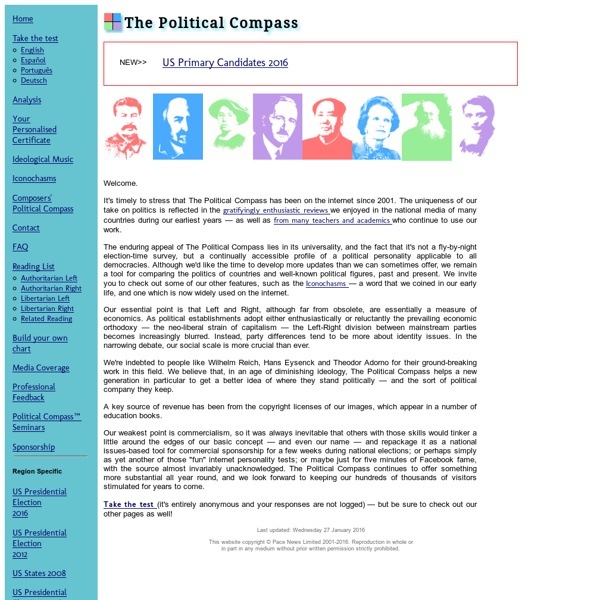



http://www.politicalcompass.org/
Egalitarianism Egalitarian and equality logo Forms[edit] Some specifically focused egalitarian concerns include economic egalitarianism, legal egalitarianism, luck egalitarianism, political egalitarianism, gender egalitarianism, racial equality, asset-based egalitarianism, and Christian egalitarianism. Candidates and Campaigns: Analyzing the 2012 Presidential Field Overview | Who will run for president in 2012? What strengths and weaknesses do potential candidates bring? How are the Republican and Democratic Parties likely to approach their presidential campaigns? In this lesson, students consider the field and the political climate and then create a class Wiki profiling the most prominent potential presidential candidates. They then take their analysis further by creating campaign strategies for the political party or specific candidate of their choice. Materials | Computers with Internet access, projector (optional)
10 Instant Emotional Fitness Tools When things get out of control and you momentarily lose your emotional balance, there are any number of little things you can do to regain it. Here are ten tools to help get you started. 1. 10 Mind-Blowing Theories That Will Change Your Perception of the World Reality is not as obvious and simple as we like to think. Some of the things that we accept as true at face value are notoriously wrong. Scientists and philosophers have made every effort to change our common perceptions of it. The 10 examples below will show you what I mean. 1. Mutualism (economic theory) Mutualism is an economic theory and anarchist school of thought that advocates a society where each person might possess a means of production, either individually or collectively, with trade representing equivalent amounts of labor in the free market.[1] Integral to the scheme was the establishment of a mutual-credit bank that would lend to producers at a minimal interest rate, just high enough to cover administration.[2] Mutualism is based on a labor theory of value that holds that when labor or its product is sold, in exchange, it ought to receive goods or services embodying "the amount of labor necessary to produce an article of exactly similar and equal utility".[3] Mutualism originated from the writings of philosopher Pierre-Joseph Proudhon. Mutualists have distinguished mutualism from state socialism, and do not advocate state control over the means of production. Mutualism, as a term, has seen a variety of related uses.
Lesson Plan: The Electoral Process: Modern Political Parties and Elections Lesson Plan: US Civics and Government Unit: The Electoral Process: Modern Political Parties and Elections Materials: To save either file format, right-click on the link and select "save target as" Objectives: The students will... 1. Define key terms relating to political parties and describe their function in American politics. 2.
Why Your Vision Must Be Grounded in Reality Whether you realize it or not, you're on a path. You can look back and see exactly how you got to where you stand today. The path ahead is far more nebulous, of course, but it's still a path. Your actions and decisions help to define it, as do all sorts of factors both in and out of your control. If you think of your path as a physical entity, you can easily see that it has certain properties.
Stop blaming technology for high unemployment! Jobs are returning with depressing slowness, and most of the new jobs pay less than the jobs that were lost in the Great Recession. Economic determinists — fatalists, really — assume that globalization and technological change must now condemn a large portion of the American workforce to under-unemployment and stagnant wages, while rewarding those with the best eductions and connections with ever higher wages and wealth. And therefore that the only way to get good jobs back and avoid widening inequality is to withdraw from the global economy and become neo-Luddites, destroying the new labor-saving technologies.
Towards a New Socialism This book (first published in 1993 by Spokesman, Nottingham, England) is our attempt to answer the idea that socialism is dead and buried after the demise of the Soviet Union. The core of the book consists of a series of chapters spelling out what we believe would be efficient and democratic methods for planning a complex economy. We also examine issues of inequality and its elimination, systems of payment for labour, a democratic political constitution for a socialist commonwealth, the commune as a set of arrangements for living, and property relations under socialism. The book "Towards a New Socialism" (TNS) is copyright (c) 1993 W. Paul Cockshott and Allin Cottrell. From this page you may access:
Un petit jeu simple, mais bien fait qui vous donne une idée d'où vous vous trouvez sur l'échiquier politique. by frederic.larochelle Feb 12